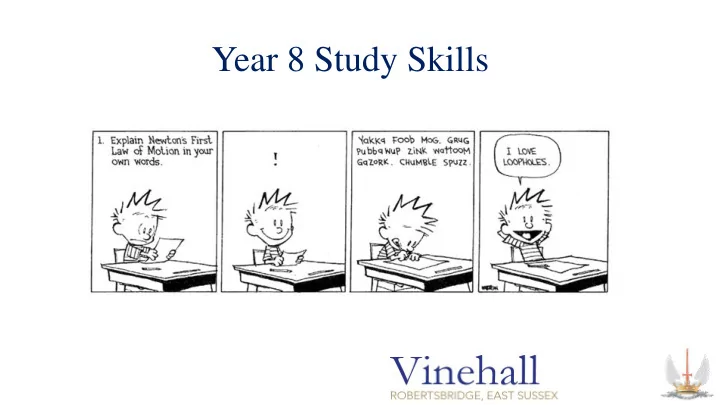

Year 8 Study Skills
Study Skills - Successful Revision Strategies 1. Organisation 2. Revision techniques 3. Getting the most out of your revision
1. Organisation – Planning Use your time effectively by planning what you are going to revise and when … BUT don’t spend so much time planning that you don’t have time to revise!
Topic How confident Have I got Tally of how Have I completed am I with this revision notes/a many times I a practice topic? (5 = very, 1 mind map/notes have reviewed question? = not at all) in my book? this topic. 3 iii Rivers and coasts Yes – mind map
Day Session 1 Session 2 Session 3 Session 4 Session 5 Session 6 Subject: Maths Subject: Geography Subject: English Subject: Subject: Subject: Topic: Topic: Topic: Topic: Topic: Topic: Significant figures - Rivers and coasts – Make question-and- CE questions Practise drawing and answer revision cards Monday 22 nd October annotating diagrams of on circuit symbols coastal landforms Time: 9.00-9.25 Time: 9.30-9.55 Time: 10.00-10.25 Time: Time: Time: Subject: Subject: Subject: Subject: Subject: Subject: Topic: Topic: Topic: Topic: Topic: Topic: Time: Time: Time: Time: Time: Time:
1. Organisation – Equipment Use ring binders with sub-dividers to organise your work (one ring binder per subject). Keep index cards in boxes with sub-dividers.
1. Organisation – Equipment Use spiral-bound notepads. Write questions on the left- hand page and answers on the right-hand page. Make sure you have all the writing equipment you need: pens, pencils, colour fine liners and highlighters.
1. Organisation – Workspace You need a tidy workspace away from distractions. (Siblings need to be kept away!) Your desk should be well lit and your room should be warm but not so warm it sends you to sleep! Leave your phone/iPad downstairs with your parents!
2.1 Revision techniques – Mind maps Mind maps group ideas and make use of colour and pictures to help you remember key words and concepts. Create your mind map on A3 paper. Use different colour fine liners for each branch and for drawing quick sketches to help you remember key ideas.
2.1 Revision techniques – Using your mind maps i) Stick your mind map up on your wall at eye-level. ii) Study one of the branches then turn away and talk through the ideas (either out loud or in your head) whilst walking across the room. iii) Repeat for the other branches. iv) Rotate the mind maps you have up every couple of days.
2.2 Revision techniques – Flow charts Flow charts also make use of colours and pictures to help you remember key words and concepts. They are most effective when ideas follow a particular sequence (usually logical or chronological).
2. Revision techniques – Index cards Index cards are most effective when a question-and- answer approach is used, with questions on the front of the index card and the answers on the back (this allows for easy self-testing). Colour and pictures can again be used to help you remember key words and concepts.
2. Revision techniques – Using index cards Work your way through one topic, putting to one side any questions to which you did not know the answer; then work through the questions you were unsure about again at the end. Regularly shuffle the cards so you do not get used to answering the questions in a particular order.
2. Revision techniques – Making notes Identify and summarise the main points for each topic. Make sure you include key words. Use abbreviations (+, =, e.g., ∴ , ∵ ) Make use of colour and pictures.
3. Getting the most out of your revision – what works? You need to identify the revision strategies that work for you. You also need to structure your day in a way that works best for you.
3. Getting the most out of your revision - exercise Higher oxygen levels in your blood increase your ability to concentrate. When you exercise, your body releases endorphins, which help you to stay positive. Exercise also helps you to sleep more soundly.
3. Getting the most out of your revision - diet Make sure you eat well in the morning before you start revising. Drink plenty of water throughout the day (if you are dehydrated you won’t be able to concentrate).
On the day… Get all your equipment ready the night before. Make sure you get a good night’s sleep. Make sure you eat something for breakfast. Avoid cramming – try to relax in the morning.
During the exam… Check where the clock is so you can keep an eye on the time. Try to divide the time you have sensibly between the questions. If a question looks particular tough, leave it and come back to it at the end. Check your answers.
Highlight any problems for discussion with your teachers well in advance of your exams!
Recommend
More recommend